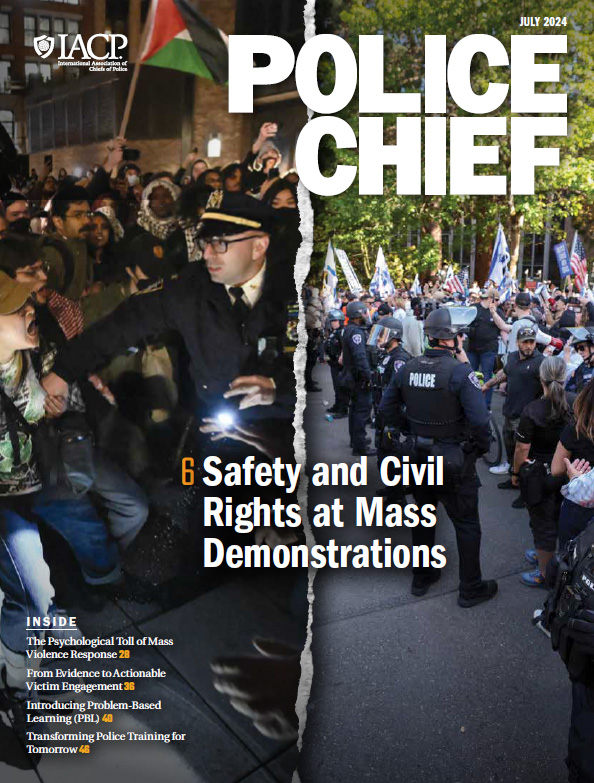Intelligence drives tactics.
~ unknown
It is late on a Friday night when an individual calls in a crime tip that a wanted subject is at a nearby residence. As police confirm the nature of the wanted status and important elements from the tip, they discover that they have a viable lead on a murder suspect at a location. Amid all the information, the recently promoted sergeant (whose last assignment was a fugitive recovery team) assembles a few officers who have ballistic equipment that the department recently purchased for use by patrol and sets a rally point. The sergeant runs his plan by the watch commander, who is also newly appointed, having served as the professional standards supervisor for the last three years. As the event unfolds, a question arises: Has anyone asked the officers or commanders if they are ready to handle the incident right in front of them? Intelligence is a fundamental component of command and control in tactical operations. It critically affects the decision-making process in understanding tactics and the threat at hand. Because of this, police organizations put forth a significant amount of attention to planning and training for positive outcomes. However, have agencies done all they can to protect them from the hubris that can cloud positive outcomes? While there is a nexus between confidence and competence, organizations must consistently pay attention to the detrimental effects of over-confidence to protect themselves and their officers from litigation and public mistrust. More important, police agencies must pay attention to how leaders can ensure the balance between competence and confidence remains proportionate.
Where Blind Confidence Leads
One significant detrimental factor to police supervision is the “confidence” level of officers. There is an old saying, “If you say something with enough confidence, it’s believable,” a perspective that can negatively affect the decision-making process. Most officers have experienced this effect within their career when an over-confident peer or supervisor convinces a superior, who appears to have little confidence in the subject matter, of a plan or activity that later was deemed not to be a good course of action. The two central issues that create this poor decision are the lack of competence on the part of the superior and the lack of competence of the officer. The questions, then, are how can agencies create environments of competence, and, more important, how can individuals ensure that they are not overly confident when they lack competence? Competent leaders are able to manage well and that means they understand the business that they are in and serve as a resource to the followers. It is equally important that competent leaders are aware of the subtle differences between “leadership” (i.e., influence, empowering, effectiveness) and “management” (i.e., efficiency), with recognizing that they require the knowledge and skill sets of both.1
A body of research exists highlighting that over-confidence distorts a person’s perception of danger, thereby creating reckless risk-taking (i.e., driving too fast in a pursuit or walking up alone on a large group of suspected criminals).2 Ultimately, this over-confidence leads to people taking shortcuts and inhibiting their own self-improvement and growth. Though this seems to be widely known, over-confidence—or simply a lack of competence—manifests itself in many ways. An overconfident officer may cut corners or overlook critical safety considerations to keep up with the natural speed of police work. A perfect example of this is an officer who wants to serve an arrest warrant but has this task preempted for a disturbing the peace call, and the officer doesn’t wait for a cover unit. The desire to quickly handle the dispatched call to free up time to do what the officer desires creates an unnecessary environment for poor outcomes, from poor customer service to tactical errors. The inherent need of performance-oriented officers is to be as efficient as possible, even at the risk of effectiveness. At the end of the day, what is the real cost? From an individual, team, and organizational perspective, the natural speed of police work and heightened expectations, coupled with limited resources, create a dangerous compromise in allowing overly confident employees to take on an unbearable risk.
Step One: Identify Context of Blind Confidence
Many Greek tragedies portray characters whose hubris carries them to ruin.3 Hubris has hampered many tactical operations that have affected police organizations in ways ranging from litigation to the worst possible scenario, the loss of life. Time frequently costs police organizations nothing more than the anxiety of action-oriented officers and provides an opportunity to ask for officers and leaders to ask themselves questions and, more importantly, to seek answers. Confident leaders know and feel they can rely on someone or something. They possess self-confidence and trust in their abilities, qualities, and judgment. They do not confuse their self-confidence with arrogance. Confident leaders cannot have too much self-confidence. They store up as much as they can to help themselves in the difficult moments and are reflective.4 Overconfidence, however, dismisses the notion of reflection and can have detrimental effects beyond the incident at hand, (i.e., creating an entire workforce of unreflective employees). Psychologist Linda Sapadin identified three major faults that create overly confident people:
1. Over-confident people surround themselves with people who are beholden to them, ultimately reinforcing their arrogance.
2. Over-confident people don’t pay attention to those who disagree with them, often labeling the dissidents as incompetent.
3. When given feedback, over-confident people often blame external causes (i.e., “It was the other person’s fault”).5
Eliminating Hubris in the Police Workplace
While there are many avenues to help officers make great decisions such as education, experience, and mentoring, four primary opportunities exist for police organizations to reduce the opportunity for hubris to impede the workplace. First, police agencies have to be committed to quality training. Tactical incidents happen every day in the field, and incidents don’t have to rise to the level of a critical incident to have tactical value. Competence is built by repeated exposure to things that matter. The front line deserves time to discuss issues that affect them daily and not wait until their agency has had a poor outcome. Several professional law enforcement organizations have multiple learning domains available such as the California Association of Tactical Officers (CATO) and the National Tactical Officers Association (NTOA). One does not have to be a SWAT officer to take advantage of learning about and understanding tactical considerations.
Second, agencies can build confidence through humility. Humility allows people to see the best in others and, more importantly, allows people to be vulnerable. Vulnerability is a precursor to trust. Building competence should come with a personal understanding that no one is held to know everything. One can reduce hubris using the Socratic paradox: Socrates’ wisdom consists in knowing what he does and does not know. In particular, that he knows nothing. How, then, does he know that he does not know what he does not know?6 Socrates’ acknowledgement of “I know that I know nothing” allows a police officer the opportunity to learn at every possible opportunity, and flexibility in thought builds creativity and collaboration.
Third, leader’s competence challenge is to create a “curious organization” through conveying a commitment to life-long learning among the agency personnel. An organization that is positioned with a mantra of “never stop learning” can do amazing things for its constituents.
Finally, do not forget the tools police agencies already have in place to ensure officers make good tactical decisions out in the field, such as the tactical matrix and risk assessments.7 Risk assessments are valuable in evaluating the presence of hazards or dangerous conditions during an operation and aid police organizations in implementing the mitigation measures necessary to protect the community and personnel.8 These options serve as a way to reduce an agency’s litigation risk as well as keep communities and employees safe. Leaders must remember that a major litigation issue for tactical considerations is a failure to supervise.
Final Reflections
While human error is probable, police leadership has a responsibility to illuminate dark issues that stand in their own way in search for excellence in police organizations. While errors happen, the acceptance of errors is not tolerable. Instead, agencies must create a healthy curiosity within their employees to be their best. Police leaders and agencies can do this by employing training, creating humility in the workplace, having an insatiable appetite for learning, and utilizing the best practices currently available. If leadership doesn’t pay attention to how organizations find themselves in compromising situations, police organizations will surely suffer. 🛡
Notes:
1 Anthony Normore and Gary Ellis, “A Self-Assessment for Law Enforcement Leadership Improvement: The 6 Traits of a Successful Police Leader,” Law Enforcement Today (February 2014).
2 Thomas Chamarro-Premuzic, “The Dangers of Confidence,” Harvard Business Review, July 2014.
3 Linda Sapadin, “Much Confidence, Little Competence,” Trans4Mind (blog), 2009.
4 Craig Manning, The Fearless Mind: 5 Essential Steps to Higher Performance (Springville, UT: Cedar Fort, Inc., 2010).
5 Sapadin, “Much Confidence, Little Competence.”
6 Scott Austin, “The Paradox of Socratic Ignorance (How to Know That You Don’t Know),” Philosophical Topics 15, no. 2 (1987).
7 National Tactical Offices Association, SWAT Standards: Tactical Response and Operations Standard for Law Enforcement Agencies, April 2018.
8 Thomas C. Bullock III “Importance of Completing a Threat Assessment Matrix prior to S.W.A.T. Activation,” National League of Cities, June 2012.
Please cite as
Brian Ellis, Anthony H. Normore, and Mitch Javidi, “Confidence without Competence: A Dangerous Recipe for Tactical Considerations,” Police Chief online, February 6, 2019.



